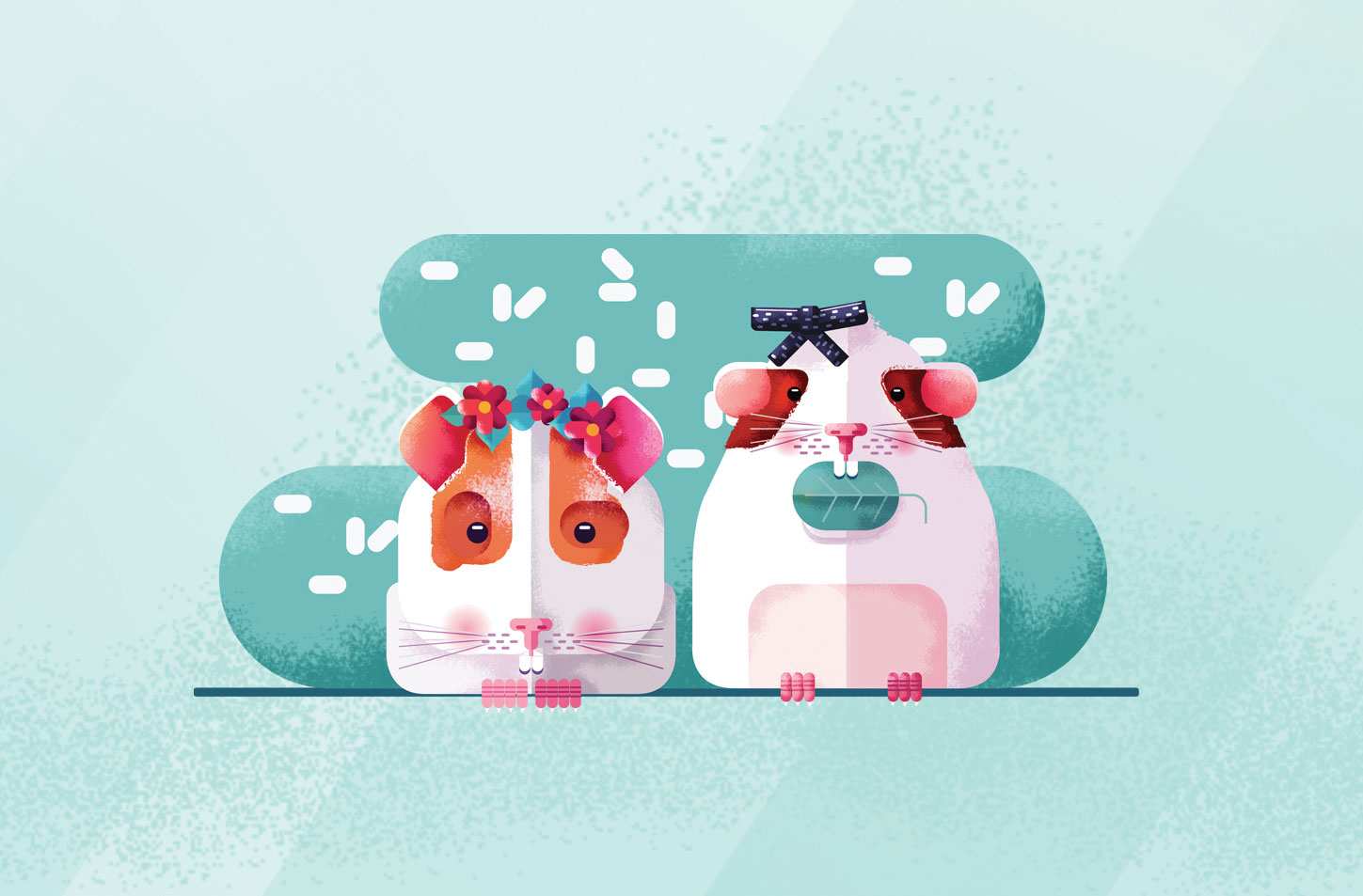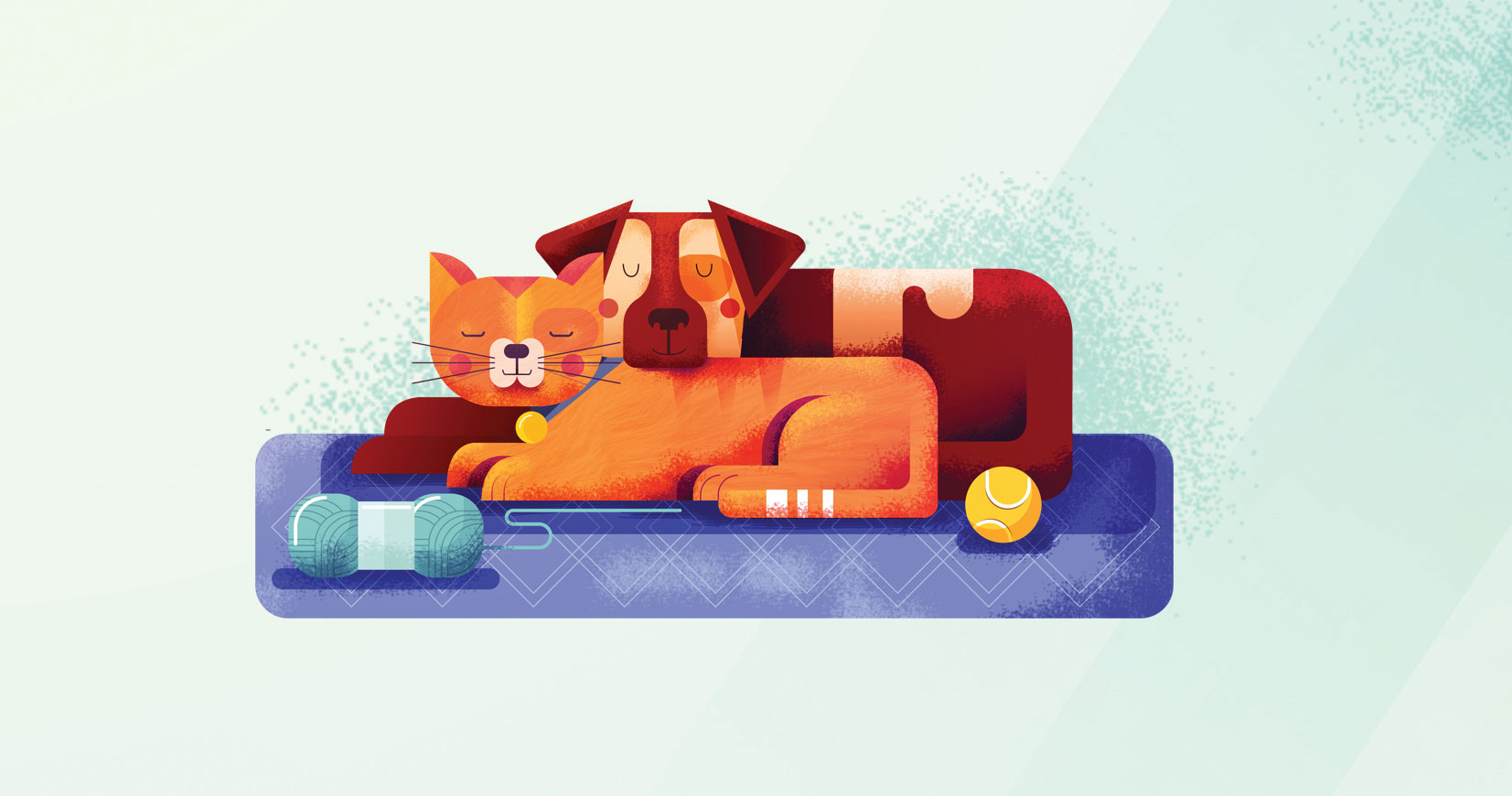Fact or fiction? Pet myths explained
Can you teach an old dog new tricks? Do cats really hate water? Do rabbits live on carrots? Read on to discover the truth behind 25 animal myths...
Dogs can fall in love
TRUE. They don't call it puppy love for nothing. Science shows that a dog’s brain releases oxytocin - the love hormone - when it interacts with humans and dogs, just the same as a human brain does when we hug or kiss.

Spaying or neutering my pet will change their personality
FALSE. Personality is not all about sex hormones – except perhaps in some teenagers! But some unwanted behaviours may be reduced, such as roaming, mounting, fighting or urine spraying.
Dogs can only see in black and white
FALSE. Although they can’t see the world in full technicolour like we can, dogs can see some colours. Their eyes detect fewer colours than ours, so their perception is similar to humans with colour blindness.
All cats hate water
FALSE. Most domestic moggies are not big fans of water, but there are some exceptions – as anyone who has watched videos of cats swimming will attest. Scientists think the reason most cats hate water could be because their coats don’t dry very quickly, which can leave them feeling pretty uncomfortable and possibly cold. The weight of the water is also likely to weigh the usually agile animal down, which means they can’t escape perceived danger as quickly. Another reason is that cats’ original descendants evolved in desert areas, where the land is baron and has very little rain, if any at all.
A female dog feels ‘empty’ if they don’t have a litter
FALSE. While hormones can affect the way the animal feels, dogs do not have the capacity to feel broody.
Horses have extraordinary memories
TRUE. They say elephants never forget, but studies have shown that horses also have extraordinary powers of memory. We all know they are highly intelligent creatures, but research has shown that they can remember human friends after long periods of separation and also have the ability to recall complex, problem-solving strategies for 10 years or more.
Cats only purr when they are happy
FALSE. Cats do purr when they're happy, but that’s not the only reason they produce this noise; they can also purr when they’re frightened or feeling unwell or in pain in order to provide comfort to themselves. Cats can also purr to comfort their young. The jury’s out on why cats purr.
I need to show my dog who’s boss by being the pack leader
FALSE. Dominance based dog training is based on studies of captive wolves in the 1970s which popularised the theory that ‘alpha’ wolves become the leader of the pack by being aggressive towards other wolves. But science has moved on and this theory has now been debunked. So ignore trainers who tell you to eat your dinner before giving your pet theirs!
Two or more male guinea pigs can’t live together
TRUE. The most suitable pairings are two females or a neutered male and a female. More than one male living together is likely to cause conflict.

Horses only sleep standing up
FALSE. When standing, a horse will lightly doze – possible thanks to a locking device in all four legs preventing them from collapsing. However, horses do need periods of deeper sleep and cannot achieve this while standing. But will only need to lie down for a couple of hours every four to five days to get enough.
Dogs have their own unique ‘fingerprint’
TRUE. Only this unique print is not found on their paws – but on their nose. This noseprint is as unique as a human fingerprint, and is so distinct that it can actually be used to identify them.
Dogs only eat grass when they are sick
FALSE: Dogs eat grass because it’s tasty.
Cats always land on their feet
FALSE. More often than not, cats will land on their feet when they fall from a height due to their ‘righting reflex’. But it’s not always the case, and every year Blue Cross vets treat cats that have fallen from heights.
Rabbits are bad luck at sea
FALSE. This centuries’ old seafaring superstition dates back to a time when a rabbit being carried on board a ship for food bit through the hold of the vessel, causing it to sink and killing hundreds on board. Although it’s just a superstition, some ferry companies still uphold a ban on rabbits being taken on board.
Rabbits mainly eat carrots
False. Feed carrots as occasional treats, but rabbits don't naturally eat root vegetables and fruits. Bunnies need hay and/or grass, some leafy greens and small amounts of rabbit food.
Cats can see in complete darkness
FALSE. Cats are much better adapted to seeing in low levels of light than us, but they can’t see in the dark.
I won’t be able to show my pet if I have them spayed or neutered
FALSE. Changes in the Kennel Club regulations mean that neutered pedigree dogs can be shown.
You can’t teach an old dog new tricks
FALSE: Puppies’ brains soak up new information like sponges and they learn quickly but, while it takes a little longer, you can train an adult dog.
Rabbits have near to 360 degree vision
TRUE. With their eyes placed high and to the side of their skull, bunnies just have a small blind spot directly in front of their face. In the wild, this remarkable field of vision allows them to quickly detect predators approaching from almost any direction.
Dogs and cats are left or right handed
TRUE. Most pets use one of their front paws more, in the same way humans are left or right handed.
Black cats are unlucky
FALSE. Black cats have been the subject of myth and folklore for centuries – in some countries they are considered unlucky, while in others felines are said to bring good fortune. In Japan, it’s thought to be good luck if a black cat crosses your path, but in much of Europe and America, a black cat is often considered a bad omen. In reality, the only supernatural powers black cats bring are that of unconditional love and affection, just like any cat.
Neutering a male dog will ‘emasculate’ them
FALSE. Removing a dog’s testicles does not make them female. In fact, it reduces the risk of some cancers and makes them less likely to show aggression towards other dogs.
Rats are dirty animals
FALSE. Because rats can live in sewers in the wild, many people assume they are dirty animals. But that couldn’t be further from the truth - rats are fastidious groomers and therefore one of the cleanest pets you can own. They are also intelligent, enjoy human company and make wonderful pets.
Cats are nocturnal
FALSE. But they are instinctively crepuscular – which means they are most active at dawn and dusk, when hunting opportunities are rife and there’s enough light for them to see well.
Dogs and cats hate each other
FALSE. Although dogs and cats are often portrayed as enemies, if introduced carefully, they can actually get on extremely well.











